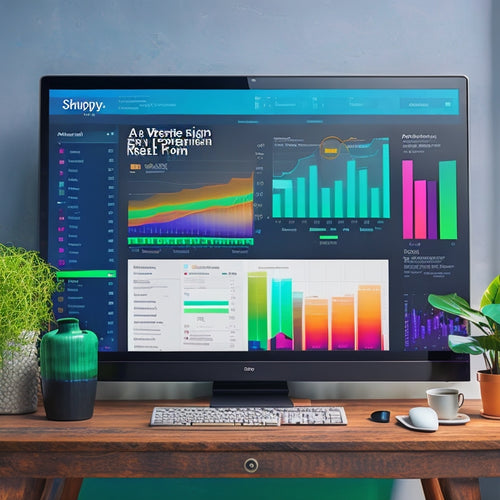
Do SEO Apps Work on Shopify
Share
This article examines the efficacy of SEO apps on the Shopify platform.
The objective of this analysis is to determine whether these apps are effective in improving the search engine optimization of Shopify websites.
By providing an overview of the benefits of using SEO apps on Shopify, offering SEO tips specific to the platform, and showcasing helpful tutorials, this article aims to inform and persuade readers about the potential value of integrating SEO apps into their Shopify websites.
- SEO apps on Shopify can significantly increase search visibility by optimizing website content and structure.
- These apps can enhance website performance by improving page load speed and user experience.
- Shopify SEO apps streamline keyword optimization by suggesting relevant keywords and tracking rankings.
- Using SEO apps on Shopify can provide a competitive advantage in the online market by offering features such as keyword optimization, meta tag customization, and site performance analysis.
Benefits of Using SEO Apps on Shopify
The use of SEO apps on Shopify can provide several benefits to online businesses.
Firstly, these apps can help increase search visibility by optimizing website content and structure, making it easier for search engines to index and rank the site.
Secondly, they can enhance website performance by improving page load speed and overall user experience, which can lead to higher conversion rates.
Lastly, these apps streamline keyword optimization by suggesting relevant keywords and helping businesses track their rankings, ultimately giving them a competitive advantage in the online market.
Increased Search Visibility
Enhancing search visibility can be achieved through the utilization of SEO apps on the Shopify platform.
When it comes to increasing search visibility, businesses can benefit from implementing effective link building strategies and local SEO optimization techniques.
Link building strategies involve acquiring high-quality backlinks from reputable websites, which can improve a website's authority and search engine rankings.
By optimizing for local SEO, businesses can target specific geographic areas and increase their visibility in local search results.
Shopify offers various SEO apps that can assist businesses in implementing these strategies.
These apps provide features such as keyword optimization, meta tag customization, and site performance analysis.
Enhanced Website Performance
Enhanced website performance can be achieved by optimizing page load times and minimizing server response time. Website speed optimization plays a critical role in providing a seamless user experience and improving search engine rankings. Slow-loading websites not only frustrate users but also lead to higher bounce rates and decreased conversions.
By optimizing page load times, website owners can ensure that their content is delivered quickly and efficiently, keeping users engaged and satisfied.
Additionally, mobile responsiveness is essential for attracting and retaining mobile users, who make up a significant portion of internet traffic. A well-optimized website that adapts to different screen sizes and resolutions will provide a smooth and enjoyable browsing experience, which in turn can lead to increased user engagement, higher conversion rates, and improved search engine visibility.
Streamlined Keyword Optimization
Streamlined keyword optimization involves conducting thorough research to identify relevant and high-ranking keywords that can effectively improve a website's search engine visibility and attract targeted organic traffic.
Keyword research is a critical component of SEO strategies as it helps website owners understand the language and terms that potential visitors use when searching for products or services. By identifying these keywords, website owners can optimize their website content, meta tags, and other elements to align with the search terms used by their target audience.
This process enhances the website's visibility and increases the chances of appearing in relevant search results. Effective keyword optimization can also help in attracting organic traffic, which refers to visitors who find the website through non-paid search engine results.
Improved User Experience
Improved user experience is a crucial aspect of website development and design. It focuses on creating a seamless and intuitive interface that allows visitors to navigate the site effortlessly and find the information or products they are looking for.
One key element of improving the user experience is through enhanced site navigation. This entails designing a clear and logical navigation structure that enables users to easily locate different sections of the website and access the desired content.
Responsive design is another important factor in improving user experience. With the increasing use of mobile devices, it is essential to ensure that websites are optimized for different screen sizes and devices. Responsive design allows the website to adapt and provide an optimal viewing experience across various platforms, enhancing user satisfaction and engagement.
Competitive Advantage Achieved
A competitive advantage can be achieved through effective website development and design strategies. In order to gain an edge over competitors, it is crucial to conduct a thorough competitive analysis.
This analysis involves identifying and evaluating the strengths and weaknesses of rival websites, as well as understanding the preferences and expectations of the target audience. By carefully studying the competition and the target audience, businesses can develop a website that stands out and meets the needs of their customers.
This includes creating a visually appealing and user-friendly interface, optimizing loading times, and implementing intuitive navigation. Additionally, integrating features such as personalized recommendations and easy checkout processes can further enhance the user experience and increase customer satisfaction.
Ultimately, a well-designed website that meets the needs and preferences of the target audience can provide a competitive advantage in the online marketplace.
SEO Tips for Shopify
When it comes to optimizing an online store for search engine optimization (SEO), there are several key points to consider.
One important aspect is the use of meta tags and descriptions, which allow search engines to understand the content of a webpage.
Additionally, optimizing product titles can help improve visibility and ranking in search results.
Another crucial factor is the use of image alt text, which not only improves accessibility but also provides search engines with relevant information about the images.
Lastly, having a well-structured URL can contribute to a better user experience and make it easier for search engines to crawl and index the website.
These key points will be discussed further in the following section.
Meta Tags and Descriptions
Meta tags and descriptions play a crucial role in enhancing the visibility and search engine ranking of Shopify websites. These elements provide important information to search engines about the content and purpose of a webpage.
By strategically optimizing meta tags and descriptions, Shopify website owners can improve their website's chances of appearing in relevant search results. Effective meta tags should include relevant keywords and accurately describe the webpage's content in a concise and compelling manner.
Additionally, meta descriptions should be well-written and provide a concise summary of the webpage's content. When creating meta tags and descriptions, it is important to consider SEO strategies such as keyword research, competition analysis, and user intent.
Optimizing Product Titles
Having discussed the importance of meta tags and descriptions in the previous subtopic, we now turn our attention to optimizing product titles.
Product description optimization is crucial for improving visibility and attracting potential customers to your Shopify store. Keyword research techniques play a significant role in this process. By conducting thorough keyword research, you can identify the most relevant and high-performing keywords to incorporate into your product titles. This will help your products rank higher in search engine results and increase their chances of being discovered by your target audience.
When optimizing product titles, it is essential to strike a balance between using relevant keywords and maintaining a clear and concise title that accurately describes the product. By implementing effective keyword research techniques, you can enhance your product titles and improve your Shopify store's overall search engine optimization.
Image Alt Text
Image alt text provides a textual description of an image on a website, allowing visually impaired users and search engines to understand and interpret the content of the image. This is particularly important for image optimization and SEO best practices. When search engines crawl a website, they rely heavily on text-based information to determine the relevance and ranking of a page.
By providing descriptive alt text for images, website owners can enhance the accessibility and search engine visibility of their content.
In terms of image optimization, alt text plays a crucial role. It helps search engines understand the context and subject matter of the image, which in turn improves the overall relevance and ranking of the webpage. Additionally, alt text can also serve as a helpful tool for visually impaired users who rely on screen readers to navigate websites.
By incorporating relevant keywords and descriptive language in the alt text, website owners can further enhance their SEO efforts and ensure that their content is accessible to a wider audience.
URL Structure
URL structure plays a pivotal role in website optimization as it determines the hierarchy and organization of web pages, facilitating both user navigation and search engine crawling. A well-optimized URL structure can significantly impact the SEO performance of a website.
One important aspect of URL structure is the inclusion of canonical tags. Canonical tags help search engines understand which version of a page is the preferred version, preventing duplicate content issues. By specifying the canonical URL, webmasters can consolidate link equity and avoid dilution across multiple variations of the same page.
Additionally, a clear and logical URL structure improves user experience by making it easier for visitors to navigate through a website. Search engines also benefit from this hierarchy, as it enables them to crawl and index the website more efficiently.
Overall, a well-structured URL plays a crucial role in improving both user experience and search engine optimization.
Helpful Tutorials for SEO Apps on Shopify
One useful resource for gaining knowledge about SEO apps on Shopify is a collection of tutorials that provide step-by-step instructions and best practices for optimizing search engine visibility. These tutorials offer valuable insights into the various features of SEO apps and how they can be utilized to enhance the visibility of a Shopify store in search engine results.
By following these tutorials, users can learn about the different SEO app features available and understand how they can be effectively implemented to improve their store's organic search rankings.
Additionally, these tutorials also provide a comparison of SEO apps for Shopify, allowing users to make an informed decision when selecting the most suitable app for their specific needs.
Overall, these tutorials serve as a comprehensive guide for Shopify store owners looking to optimize their search engine visibility and drive organic traffic to their websites.
Learn More About SEO Apps on Shopify
A comprehensive understanding of the functionality and capabilities of SEO applications on the Shopify platform can be gained through further exploration and research.
SEO app effectiveness on Shopify can vary based on the specific app chosen and the individual website's needs. These apps aim to improve website rankings on search engine results pages by optimizing various elements such as meta tags, keywords, and site structure. They offer features like keyword research, content optimization, and backlink analysis.
However, it is essential to consider the limitations of these apps. They may not be able to address all SEO factors, and their success depends on other factors like website quality and competition.
Therefore, it is crucial to assess the specific features and limitations of each SEO app and determine how they align with your business goals and requirements.
Frequently Asked Questions
Can SEO Apps on Shopify Guarantee a Top Ranking on Search Engine Results Pages?
SEO apps on Shopify can potentially improve a website's search engine rankings. However, guaranteeing a top ranking on search engine results pages solely through the use of SEO apps is not possible due to various factors influencing search engine algorithms.
Are There Any Limitations or Restrictions When Using SEO Apps on Shopify?
The limitations of using SEO apps on Shopify should be considered. Though these apps can be effective in optimizing websites for search engines, they may have restrictions in terms of features, customization options, and compatibility with certain themes or plugins.
How Do SEO Apps on Shopify Handle Keyword Research and Optimization?
SEO apps on Shopify handle keyword research and optimization by providing features such as keyword suggestion, on-page optimization, and tracking of keyword rankings. The effectiveness of these apps in improving SEO can vary depending on factors such as website content and competition.
Can SEO Apps on Shopify Improve the Loading Speed and Overall Performance of My Website?
SEO apps on Shopify can improve website loading speed and overall performance, resulting in an enhanced user experience and optimized mobile performance. These apps offer various features and optimizations that can positively impact website performance and ultimately contribute to better search engine rankings.
Are There Any Additional Costs Associated With Using SEO Apps on Shopify?
The effectiveness of SEO apps on Shopify is subject to debate and may vary depending on individual circumstances. It is important to consider the potential additional costs associated with using SEO apps on Shopify, such as subscription fees or charges for premium features.
Related Posts
-
Shoppable Video: Transforming Retail's Future
Shoppable video is revolutionizing the future of retail by seamlessly integrating the discovery and purchase processe...
-

How Do I Improve SEO on My Shopify Website
This article examines methods to enhance search engine optimization (SEO) on Shopify websites. It begins by discussi...
-

What Is the Best Email Platform for Shopify
This article aims to provide an informative and objective analysis of the best email platform for Shopify. It will e...

